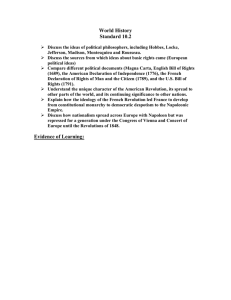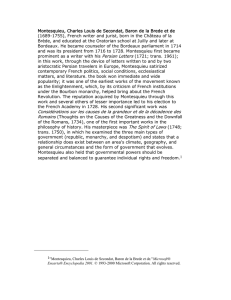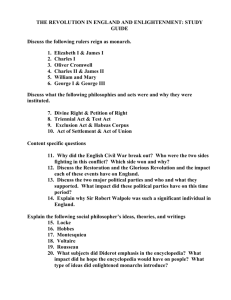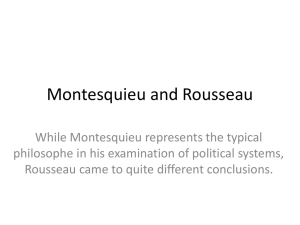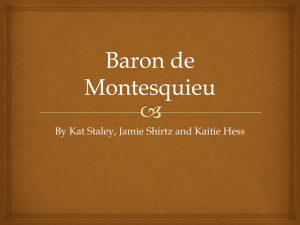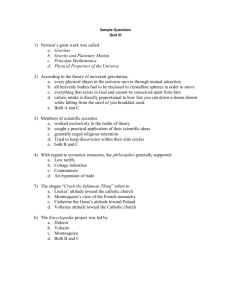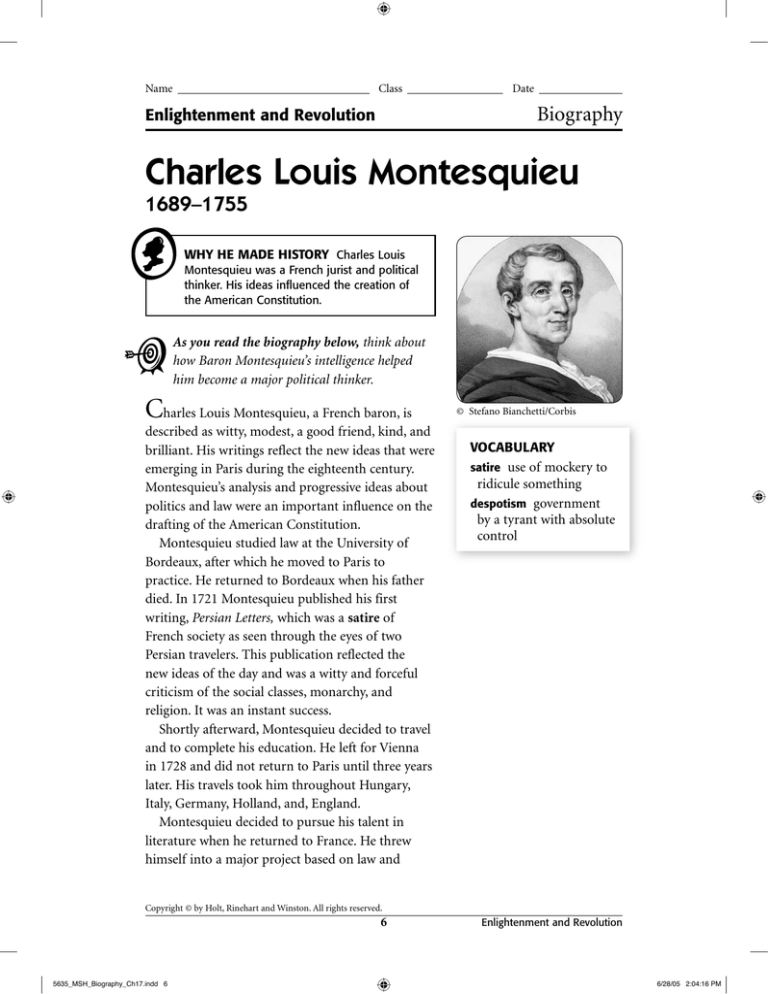
Name
Class
Date
Biography
Enlightenment and Revolution
Charles Louis Montesquieu
1689–1755
WHY HE MADE HISTORY Charles Louis
Montesquieu was a French jurist and political
thinker. His ideas influenced the creation of
the American Constitution.
As you read the biography below, think about
how Baron Montesquieu’s intelligence helped
him become a major political thinker.
Charles Louis Montesquieu, a French baron, is
described as witty, modest, a good friend, kind, and
brilliant. His writings reflect the new ideas that were
emerging in Paris during the eighteenth century.
Montesquieu’s analysis and progressive ideas about
politics and law were an important influence on the
drafting of the American Constitution.
Montesquieu studied law at the University of
Bordeaux, after which he moved to Paris to
practice. He returned to Bordeaux when his father
died. In 1721 Montesquieu published his first
writing, Persian Letters, which was a satire of
French society as seen through the eyes of two
Persian travelers. This publication reflected the
new ideas of the day and was a witty and forceful
criticism of the social classes, monarchy, and
religion. It was an instant success.
Shortly afterward, Montesquieu decided to travel
and to complete his education. He left for Vienna
in 1728 and did not return to Paris until three years
later. His travels took him throughout Hungary,
Italy, Germany, Holland, and, England.
Montesquieu decided to pursue his talent in
literature when he returned to France. He threw
himself into a major project based on law and
© Stefano Bianchetti/Corbis
VOCABULARY
satire use of mockery to
ridicule something
despotism government
by a tyrant with absolute
control
Copyright © by Holt, Rinehart and Winston. All rights reserved.
6
5635_MSH_Biography_Ch17.indd 6
Enlightenment and Revolution
6/28/05 2:04:16 PM
Name
Class
Date
Charles Louis Montesquieu, continued
Biography
politics. After extensive research, Montesquieu
published The Spirit of Laws, one of the greatest
works on political theory and the history of law.
This work brought him fame but also criticism,
especially from the Catholic Church in Rome,
where it was put on the list of banned books.
In this work, three themes are most notable. The
first theme is the classification of governments into
three types: the republic, based on virtue; the
monarchy, based on honor; and despotism, based
on fear. In his second theme, Montesquieu proposes
that a government’s power should be divided into
three branches that work independently of each
other—legislative, executive, and judicial branches.
The third theme that Montesquieu wrote about is
that the individual and society are affected by
physical climate. He believed that human dignity
must be upheld, and that slavery, despotism, and
intolerance are evil. These ideas led Montesquieu
to be considered one of the leading political
philosophers of his time.
WHAT DID YOU LEARN?
1. Identify What are the three classifications of government in Charles Louis
Montesquieu’s work, The Spirit of Laws?
2. Evaluate Which aspects of Montesquieu’s thinking do you think influenced the
writing of the American Constitution?
ACTIVITY
Imagine that you are a book critic assigned to write about the themes
covered in Montesquieu’s The Spirit of Laws. Write a short paper
describing which of the three main themes that you consider being the
most important. Explain your answer.
Copyright © by Holt, Rinehart and Winston. All rights reserved.
7
Enlightenment and Revolution
Answer Key
Enlightenment and Revolution
Vocabulary Builder
Section 1
Biography
Mary Wollstonecraft
1.
2.
3.
4.
5.
6.
7.
8.
9.
10.
WHAT DID YOU LEARN?
the Age of Reason
a social gathering held to discuss ideas
a non-religious movement
Mary Wollstonecraft
Voltaire
Enlightenment
secular
Adam Smith
Denis Diderot
salon
1. A Vindication of the Rights of Woman
was about women’s rights to formal
education.
2. Accept reasonable answers.
Biography Charles Louis
Montesquieu
WHAT DID YOU LEARN?
1. The three classifications of government in
Vocabulary Builder
Section 2
Montesquieu’s Spirit of the Laws are; the
republic, based on virtue; monarchy, based
on honor; and despotism, based on fear.
2. Possible answers: The aspects of
Montesquieu’s thinking that may have
influenced the American Constitution
are his belief in the importance of human
dignity and the evils of despotism,
slavery and intolerance. He argued that
government should be divided into three
separate powers; legislative, executive,
and judicial working independently of
each other.
1. true
2. false—John Locke argued for government
3.
4.
5.
6.
7.
as a contract between the ruler and
the people.
false—Charles Louis Montesquieu
believed that a government should be
divided into separate bodies, or branches,
to protect people’s freedom.
false—Benjamin Franklin argued against
“taxation without representation” when
he addressed Parliament’s House of
Commons stating that the colonists had
no representative in Parliament.
true
true
true
Biography
Thomas Jefferson
WHAT DID YOU LEARN?
1. Jefferson’s most important achievement as
president was the Louisiana Purchase.
Vocabulary Builder
Section 3
2. Possible Answer: The main difference
between the Federalist and the Republican
parties was that the Federalists wanted
a strong central government while the
Republicans wanted a decentralized
government with strong individual
state rights.
1. regime
2. Declaration of the Rights of Man and of
3.
4.
5.
6.
7.
8.
9.
10.
the Citizen
English Bill of Rights
Declaration of Independence
Bastille
First Continental Congress
unalienable
Articles of Confederation
U.S. Constitution
Magna Carta; English Bill of Rights
Copyright © by Holt, Rinehart and Winston. All rights reserved.
35
Enlightenment and Revolution

